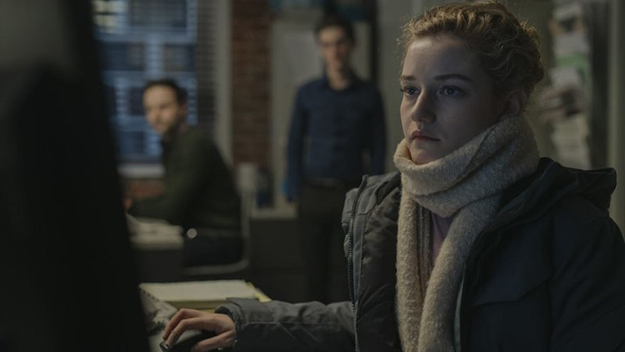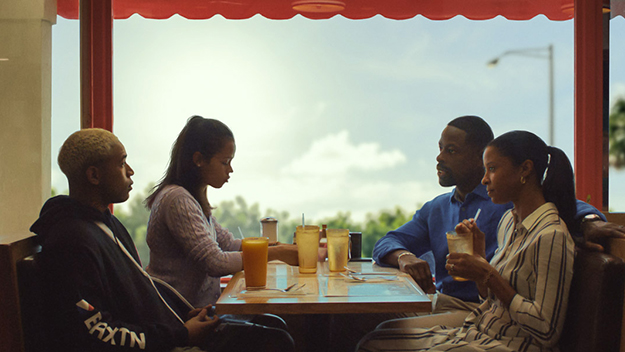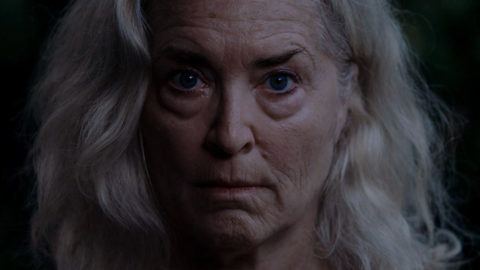Telluride 2019 Dispatch: Waves and The Assistant
Anticipated new films from established American indie auteurs—Noah Baumbach (Marriage Story), Kelly Reichardt (First Cow), and Benny and Josh Safdie (Uncut Gems)—were highlights of the 46th Telluride Film Festival in Colorado over Labor Day weekend. But brand-new films from a pair of younger directors, Kitty Green (The Assistant) and Trey Edward Shults (Waves), were also among the most talked-about films at an intimate annual event that is fueled by buzz from moviegoers. Extra screenings of both films were added late in the festival to meet audience demand.

The Assistant (Kitty Green, 2019)
The words “based on a true story” are evocative, and can be alluring, for moviegoers looking to explore real-life events or ripped-from-the-headlines narratives. But what would the words “based on hundreds of true stories” tell an audience? Such a disclaimer does not appear on screen at the start of Kitty Green’s new film, The Assistant, a searing new fiction film that was based on years of documentary research, but it might as well have been.
Two years ago, as word of numerous sexual abuse charges against Harvey Weinstein were revealed, Kitty Green, the Australian director of the 2017 documentary, Casting JonBenet, was working on a new doc about sexual misconduct on college campuses. As the Weinstein story exploded into a wide #MeToo movement of consciousness around sexual abuse and harassment, Green pivoted. She enlisted the support of screenwriter, producer and former Focus Features head James Schamus and producer and Filmmaker Magazine editor Scott Macaulay, producers of her Jon Benet film, and the project quickly evolved into an examination inward—looking at the film industry.
Green interviewed hundreds of women in film and heard stories that were strikingly similar.
“I interviewed all these people and the same stories came up again and again and these patterns kind of emerged,” Kitty Green said of the research process and the experiences that she uncovered, during a conversation in Telluride. “It felt so repetitive. They were specific to every person, but there was a commonality.”
Following a day in the life of a low level-staffer at a fictional film company, The Assistant reveals the abuse, overt bad behavior, and micro-aggressions simmering within the contemporary workplace. In a popular series like The Office, mistreatment of workers by a clueless boss is played for laughs, but in Green’s The Assistant, the harsh reality of office abuses (and systems that allow them to continue) are revealed through the detailed depiction of the assistant’s mundane and often brutal task list.
Harvey Weinstein is never named in the movie, but the shadowy figure looming just out of sight, behind the door of his office, barely heard and never witnessed in full, is hauntingly familiar. The voice actor, who performs as “The Boss” in mostly muffled tones, sure sounds a lot like Harvey.
“I would hear the same story from someone in London who worked at Miramax 20 years ago as from someone who works for a producer who’s still working right now in New York City and who is his assistant now,” Green said.
Named for the anonymous everywoman, Jane (Julia Garner) is an assistant at the modest but growing international film company. She is weeks into a new job as the third assistant anchored outside The Boss’s office and over the course of a day manages a string of duties—planning travel, weathering treatment from the other slightly higher-ranking assistants, discovering a lost earring in The Boss’s office, navigating phone calls from his suspicious wife, cleaning a stain from his couch, setting up an inexperienced young woman who was unexpectedly hired by her boss and whom he’s installed at a luxury hotel— that clarify the toxic environment in which she works.
The assistant character became a stand-in for the experiences of countless women who Kitty Green spoke with—a composite character painted from the brushstrokes of hundreds of individual stories. She investigates and exposes the range of experiences women face at work and the pushback that can come from informing internal authorities. A telling meeting with an HR rep goes nowhere and leaves her disillusioned that anything might change.
“I don’t want to conflate gendered work environments with sexual assault but it is exploring both of those themes,” Green said.
The Assistant was notable in Telluride as the rare world premiere of an indie film this year. Unlike the anticipated new movies aiming for end-of-year attention by making a stop in Telluride after a festival screening in Venice or prior to a showing in Toronto, it arrived without distribution at the intimate, tony Labor Day weekend film showcase in Colorado. The film screened in the festival’s smallest venues all weekend but sold out its scheduled and encore screenings as its producers sought to secure a distribution deal. Because it was tough for festival-goers to secure a seat at one its few Telluride shows, buzz about the film only intensified as the weekend went on.
Some insiders wondered whether a film with such an insider view of the film industry would find an audience. Others asked if buyers might resist releasing a film that forces them to look in the mirror and grapple with the inequities within their own companies.
In fact, The Assistant hardly focuses on the movie business at all; instead it is an urgent, quiet scream. It’s a jarring portrait of today’s contemporary workplace where too many women remain marginalized. And worse.
“I wanted to explore the way the system is bigger than just a few rotten apples and bad men,” Kitty Green said. “It’s linked up to a cultural problem, which is we are not taking women seriously. Women’s self-confidence is stripped away so quickly. Until we have some kind of equality, nothing’s going to change.”

Waves (Trey Edward Shults, 2019)
A vibrant, swirling new film about a black family navigating unimaginable tragedy, Waves comes from a seemingly unexpected place: namely, the Texas-born and Florida-based (white) filmmaker Trey Edward Shults. But there’s more to that story. Comprised of two distinct halves, each focused on one sibling in an upper-middle-class suburban South Florida family, Waves mines the roots and results of both love and pain in an African American family.
Siblings Tyler and Emily are on dramatically different trajectories in Waves. The older brother (Kelvin Harrison Jr.) is on a downward spiral amidst paternal pressures, a wrestling injury and a brewing conflict with his girlfriend, while the younger sister Emily (Taylor Russell) is finding hope and escape through her budding relationship with a boy at school (Lucas Hedges).
The new film follows It Comes at Night, Shults’s 2017 film, a movie that he says left him feeling misunderstood. Like his 2015 movie Krisha, It Comes at Night was a personal story but people didn’t get it, Shults said in an interview at Telluride over the weekend. So with Waves, he dug even deeper, but also buried some of his own story in an unlikely character, namely in a young African American kid, a teenage wrestler, who like himself, was injured and at odds with his dad.
Shults spent nearly 10 years working on the story but his script changed course a few years ago when he brought it to It Comes at Night actor Kelvin Harrison Jr. (who plays Tyler) and told the actor that he could have any role he wanted. By that point the script had evolved from a hangout movie à la Linklater’s Dazed and Confused into a heavier, two-part exploration of love and tragedy within a contemporary American family.
Tyler’s story is anchored in the first half of Waves, marked by flourishes of mesmerizing, bold visuals that give way to a more restrained but still stirring sequence of images in the tonally opposite second half of the movie, when Tyler’s sister falls for a kid from school. That sends the movie into a more hopeful direction as Lucas Hedges’s character bonds with her and then grapples with the fractures in his own family. Music is core to the experience throughout with a score by Trent Reznor and Atticus Ross, as well as songs by Animal Collective, Frank Ocean, Radiohead, and others.
“It was a constant evolution,” Shults said. “For a while it was just the Tyler half. It was images and feelings and broad strokes. Then I saw Chungking Express and realized it could be something bigger.”
Once Shults expanded his story, he also saw its script become more complex. It would unexpectedly develop into a story of contemporary black life in America today, a window into the lives of cautious, demanding parents, kids skirting danger, and pressured, isolated teens.
Shults said he hadn’t specified the race of the family in his script, but embraced the specificity when Kelvin Harrison Jr. chose the Tyler role. According to Shults, Harrison wondered, “Should I not do it just because I am black?” when he sought the role.
With Harrison Jr. on board but working on another movie at the time, he and Shults began texting each other and the young actor shared some ideas, plot points from his own life. That allowed Shults to redirect and flesh out a new script that fused their two stories into one, the writer/director said; for example, they bonded over parallel experiences with their fathers and growing up.
“It took things to another level and it changed the dynamics and the nuance of a black family,” Shults said. “I’m a white dude and it’s about a black family. To me, combining the nuance and specificities of both of us is what hopefully makes it more universal.”
Then Shults offered an assessment of his own film that startled me a bit and forced me to rethink what I’d watched.
“At the end of the day, I don’t think the movie is about race,” Shults said earnestly but definitively.
That’s a surprising statement, I responded gently. For an African American family, or black kids (or a brown journalist) Waves is certainly about race, about being different, standing out and facing the pressures of POC parents. All the same it’s also a film about American teens broadly, about siblings, about children and parents. Shults is aiming for the universal by embracing specific themes and elements that are rooted in his own life, even if they are expressed through characters that might seem far from his own experience.
“A lot of things in the movie start from pure autobiography and then spin off into narrative and then come back again,” Shults said. “Everything is wrapped up in this movie for me. A lot of people have no idea and it’s not mine anymore—it’s other people’s and it’s a weird vulnerable thing right now.”
Waves is playing next at the Toronto International Film Festival and will open in U.S. theaters in November. The Assistant is seeking distribution.
Eugene Hernandez is Deputy Director of Film at Lincoln Center and Co-Publisher of Film Comment.





